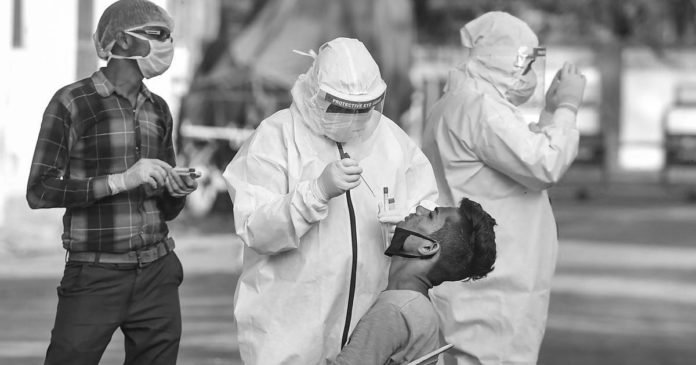India recorded 58,077 new cases of the novel coronavirus, along with 657 deaths due to the infection in the past 24 hours. According to the data shared by the Union Health Ministry on Friday (February 11), the country saw a total of 1,67,882 discharges in the last 24 hours, taking the total recovery rate at around 96.95 per cent and total recoveries data reached to 4,13,31,158.
The total active cases of COVID-19 in India have declined to 6,97,802 (1.64 per cent) the ministry data showed today.
The total death toll in the country is now at 5,07,177. In India, the first death due to the COVID pandemic was reported in March 2020.
The daily positivity rate is at 3.89 per cent today.
According to the Indian Council of Medical Research (ICMR), 74,78,70,047 samples have been tested up to February 10 for COVID-19. Of these 14,91,678 samples were tested on Thursday.
Meanwhile, Delhi reported 1,104 fresh cases of coronavirus on Thursday and 12 deaths, according to data released by the city’s health department. The Covid-19 test positivity rate in the national capital was recorded at 2.09 per cent, data added further. With this, the national capital’s coronavirus case count increased to 18,48,619 and the death toll climbed to 26,035, the latest bulletin stated.
As many as 52,848 COVID-19 tests were conducted in the city the previous day, it said. The number of people in home isolation stands at 3573, down from 4,134, the day before, it said. There are 20,384 containment zones in the city, a fall from 23,052 on Wednesday, it said. The number of active COVID-19 cases stands at 5,438. On Wednesday, the national capital reported 1,317 fresh COVID-19 cases with a positivity rate of 2.11 per cent, while 13 more people succumbed to the viral disease, according to data shared by the city health department.
The number of daily cases in Delhi has been on the decline after touching the record high of 28,867 on January 13. The city had recorded a positivity rate of 30.6 per cent on January 14, the highest during the ongoing wave of the pandemic. It took just 10 days for daily cases to drop below 10,000.
More about Omicron
The Omicron variant has been called a variant of concern by WHO based on studies that shows it has several mutations.
Still a lot of research is underway to evaluate its transmissibility, severity and reinfection risk.
The Omicron variant has been detected in several regions of the world. WHO reports that the likelihood of the Omicron variant spreading further globally is high.
It is not currently known if the Omicron variant is more or less severe than other strains of COVID-19, including Delta. Studies are ongoing and this information will be updated as it becomes available.
It is not yet clear whether Omicron can spread more easily from person to person compared to other variants, such as Delta.
However, being vaccinated and taking precautions such as avoiding crowded spaces, keeping your distance from others and wearing a mask are critical in helping to prevent the spread of COVID-19, and we know these actions have been effective against other variants.
Researchers are looking into any potential impact the Omicron variant has on the effectiveness of COVID-19 vaccines. Although information is still limited, WHO believes it is a reasonable assumption that the currently available vaccines offer some protection against severe disease and death.
It is also important to be vaccinated to protect against the other widely circulating variants, such as the Delta one. When it’s your turn, make sure to get vaccinated. If your vaccination involves two doses, it’s important to receive both in order to have the maximum protection.
According to WHO, early evidence suggests that people who have previously had COVID-19 could be reinfected more easily with Omicron, in comparison to other variants of concern. Information is still limited though and we will share updates as it becomes available.
Source: UNICEFRead more Health News
Latest update Omicron

